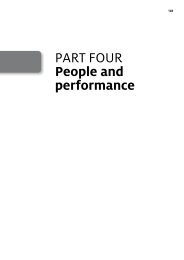The growing business handbook : inspiration and advice ... - Sparkler
The growing business handbook : inspiration and advice ... - Sparkler
The growing business handbook : inspiration and advice ... - Sparkler
You also want an ePaper? Increase the reach of your titles
YUMPU automatically turns print PDFs into web optimized ePapers that Google loves.
264 Growth capital<br />
days when finance staff were just seen as number crunchers are largely behind us<br />
but the quid pro quo for being taken seriously as <strong>business</strong> influencers is that you<br />
have to demonstrate that you can make a difference <strong>and</strong> to do that you need a<br />
number of different <strong>business</strong> skills.<br />
Steve Cresswell, EMEA CFO <strong>and</strong> COO, Jones Lang LaSalle<br />
<strong>The</strong> evidence is that the roles undertaken by the finance function <strong>and</strong> its personnel<br />
have evolved away from the traditional information-provision model <strong>and</strong> towards a<br />
more <strong>business</strong>-oriented model. However, the change has not been revolutionary in<br />
that, for example, traditional structures such as the finance department persist <strong>and</strong><br />
the vast majority of finance professionals still see themselves as part of the finance<br />
function.<br />
Rates of change have varied across the range of organizations <strong>and</strong> there are<br />
constraints on how far many will travel down this path of further integration with the<br />
<strong>business</strong>. Notably, continuing the dem<strong>and</strong> for the traditional services of the finance<br />
function indicates the need for a portfolio of skills <strong>and</strong> talents within the finance<br />
function, with an important continuing role for those finance professionals who do<br />
not seek to operate as partners integrated in the <strong>business</strong>. Those who develop as<br />
<strong>business</strong> partners or with greater collaboration with the <strong>business</strong> will help the finance<br />
function to better integrate its activities with <strong>and</strong> meet the needs of the organization<br />
shifting towards the creation of value. But the organization’s <strong>business</strong> partnering<br />
vision will require management sensitivity to preserve the independence <strong>and</strong><br />
objectivity of the finance function so vital to ensuring accurate <strong>and</strong> credible <strong>business</strong><br />
planning <strong>and</strong> reporting.<br />
This chapter is based on research by the CIMA Centre of Excellence at the University<br />
of Bath School of Management.<br />
CIMA, the Chartered Institute of Management Accountants, is the world’s leading<br />
<strong>and</strong> largest professional body of management accountants, with 172,000 members<br />
<strong>and</strong> students operating at the heart of <strong>business</strong> in 168 countries. Chartered<br />
Management Accountants have broad-ranging <strong>business</strong> <strong>and</strong> management skills to<br />
complement their financial training. <strong>The</strong>y offer strategic <strong>and</strong> practical <strong>advice</strong>; make<br />
<strong>and</strong> support key decisions; <strong>and</strong> manage risk. CIMA develops high-quality professionals<br />
through a combination of skills, knowledge <strong>and</strong> the most relevant financial<br />
qualification for <strong>business</strong> – driving <strong>business</strong> success.<br />
For more information visit: www.cimaglobal.com/<strong>growing</strong><strong>business</strong><strong>h<strong>and</strong>book</strong>2.








